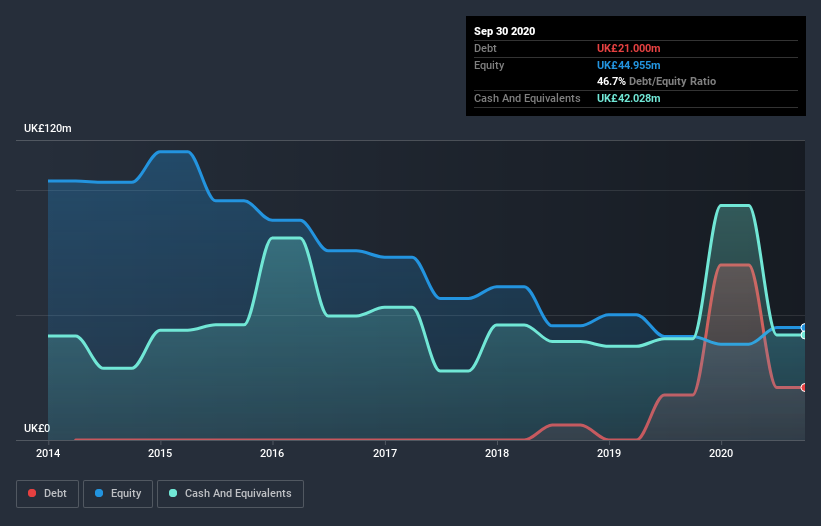- United Kingdom
- /
- Diversified Financial
- /
- LSE:PAY
These 4 Measures Indicate That PayPoint (LON:PAY) Is Using Debt Safely

Warren Buffett famously said, 'Volatility is far from synonymous with risk.' So it might be obvious that you need to consider debt, when you think about how risky any given stock is, because too much debt can sink a company. We note that PayPoint plc (LON:PAY) does have debt on its balance sheet. But should shareholders be worried about its use of debt?
When Is Debt A Problem?
Debt assists a business until the business has trouble paying it off, either with new capital or with free cash flow. In the worst case scenario, a company can go bankrupt if it cannot pay its creditors. However, a more frequent (but still costly) occurrence is where a company must issue shares at bargain-basement prices, permanently diluting shareholders, just to shore up its balance sheet. Of course, plenty of companies use debt to fund growth, without any negative consequences. The first step when considering a company's debt levels is to consider its cash and debt together.
See our latest analysis for PayPoint
How Much Debt Does PayPoint Carry?
You can click the graphic below for the historical numbers, but it shows that as of September 2020 PayPoint had UK£21.0m of debt, an increase on UK£18.0m, over one year. However, its balance sheet shows it holds UK£42.0m in cash, so it actually has UK£21.0m net cash.

A Look At PayPoint's Liabilities
The latest balance sheet data shows that PayPoint had liabilities of UK£163.4m due within a year, and liabilities of UK£12.0k falling due after that. Offsetting these obligations, it had cash of UK£42.0m as well as receivables valued at UK£67.9m due within 12 months. So its liabilities outweigh the sum of its cash and (near-term) receivables by UK£53.5m.
Since publicly traded PayPoint shares are worth a total of UK£418.2m, it seems unlikely that this level of liabilities would be a major threat. Having said that, it's clear that we should continue to monitor its balance sheet, lest it change for the worse. Despite its noteworthy liabilities, PayPoint boasts net cash, so it's fair to say it does not have a heavy debt load!
The good news is that PayPoint has increased its EBIT by 8.6% over twelve months, which should ease any concerns about debt repayment. The balance sheet is clearly the area to focus on when you are analysing debt. But it is future earnings, more than anything, that will determine PayPoint's ability to maintain a healthy balance sheet going forward. So if you're focused on the future you can check out this free report showing analyst profit forecasts.
Finally, a business needs free cash flow to pay off debt; accounting profits just don't cut it. While PayPoint has net cash on its balance sheet, it's still worth taking a look at its ability to convert earnings before interest and tax (EBIT) to free cash flow, to help us understand how quickly it is building (or eroding) that cash balance. During the last three years, PayPoint generated free cash flow amounting to a very robust 97% of its EBIT, more than we'd expect. That positions it well to pay down debt if desirable to do so.
Summing up
Although PayPoint's balance sheet isn't particularly strong, due to the total liabilities, it is clearly positive to see that it has net cash of UK£21.0m. And it impressed us with free cash flow of UK£53m, being 97% of its EBIT. So we don't think PayPoint's use of debt is risky. The balance sheet is clearly the area to focus on when you are analysing debt. However, not all investment risk resides within the balance sheet - far from it. To that end, you should learn about the 3 warning signs we've spotted with PayPoint (including 1 which is is a bit unpleasant) .
If you're interested in investing in businesses that can grow profits without the burden of debt, then check out this free list of growing businesses that have net cash on the balance sheet.
When trading PayPoint or any other investment, use the platform considered by many to be the Professional's Gateway to the Worlds Market, Interactive Brokers. You get the lowest-cost* trading on stocks, options, futures, forex, bonds and funds worldwide from a single integrated account. Promoted
New: Manage All Your Stock Portfolios in One Place
We've created the ultimate portfolio companion for stock investors, and it's free.
• Connect an unlimited number of Portfolios and see your total in one currency
• Be alerted to new Warning Signs or Risks via email or mobile
• Track the Fair Value of your stocks
This article by Simply Wall St is general in nature. It does not constitute a recommendation to buy or sell any stock, and does not take account of your objectives, or your financial situation. We aim to bring you long-term focused analysis driven by fundamental data. Note that our analysis may not factor in the latest price-sensitive company announcements or qualitative material. Simply Wall St has no position in any stocks mentioned.
*Interactive Brokers Rated Lowest Cost Broker by StockBrokers.com Annual Online Review 2020
Have feedback on this article? Concerned about the content? Get in touch with us directly. Alternatively, email editorial-team@simplywallst.com.
About LSE:PAY
PayPoint
Engages in the provision of payments and banking, shopping, and e-commerce services and products in the United Kingdom.
Proven track record average dividend payer.


